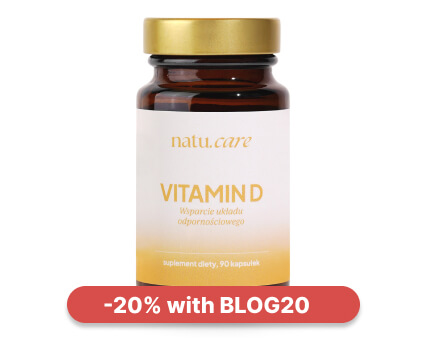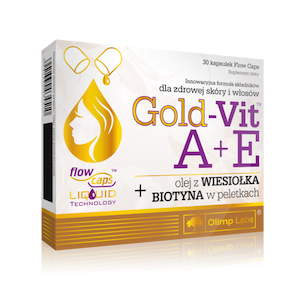The best multivitamin: which set of vitamins to choose? [Ranking]
Is a multivitamin for you? Find out what the experts, not the adverts, say about vitamin complexes!


Learn more about our editorial process
.

Learn more about our editorial process
.

Learn more about our editorial process
.

Learn more about our editorial process
.![The best multivitamin: which set of vitamins to choose? [Ranking]](https://cdn-resources.natu.care/uploads/1/multiwitaminy_hero_e13cf2be8e.jpg)
Why you can trust us
Articles on Natu.Care are written based on scientific research, data from government websites and other reliable sources. The texts are written in cooperation with doctors, nutritionists and other health and beauty experts. Articles are reviewed before publication and during significant updates.
.Learn more about our editorial process
.Information about advertisements
Content on Natu.Care may contain links to products from the sale of which we may receive a commission. When creating content, we adhere to high editorial standards and take care to be objective about the products discussed. The presence of affiliate links is not dictated by our partners, and we select the products we review ourselves completely independently.
.Learn more about our terms and Conditions
.Vitamins are health, simple as that. If each one individually adds value, why not complete the whole abecadal at once?
Multivitamins are one of the most popular supplements nationally and internationallyand. In theory, it makes sense. But is this actually the case in practice? You'll find out everything here based on scientific research. You'll also learn tips and advice from Master of Pharmacy, Ilona Krzak.
When reaching for supplements, it is easy to forget that we should primarily provide vitamins and minerals in our daily diet. Clinical nutritionist, Julia Skrajda, will explain to you for whom (and in which cases) multivitamins are advisable... and also when not to even think about it.
Take your own supplements.
From this article you will learn:
- What vitamin supplements the experts recommend.
- What the experts recommend.
- Whether multivitamins make sense.
- When to reach for multivitamins.
- When to reach for multivitamins.
- How to choose the best multivitamin for your needs.

Zobacz, co dla Twojego zdrowia może zrobić Natu.Care Witamina D 2000 IU. -15% z kodem BLOG15
Natu.Care Witamina D 2000 IU
Natu.Care Witamina D 2000 IU wspiera prawidłowe działanie układu odpornościowego, utrzymanie zdrowych kości i zębów oraz utrzymanie prawidłowych funkcji serca, nerek i układu mięśniowego.
Sprawdź cenę
Świetny produkt, tabletki są małe i wygodne do połknięcia. Plus za wysoką jakość!Joanna
The best multivitamins on the market
.
TOP 6 best multivitamins - ranking
.
- ibuvit MultiSpec .
- Pharmovit Multivit Max Complex Active .
- Primabiotic Multivitamin .
- ALLDEYNN VITAROSE .
- Yango Multivitamin for Women .
- Yango multivitamin for men .
Below you will find descriptions of products created for adults, women, men and the elderly.
The most important criteria for product selection are:
.
- .
- complexity of composition and formulation, .
- optimal coverage of the daily requirement of the individual components,
- the
- presence of minerals in the form of chelates, which are better absorbed than other forms, .
- safety of use, .
- price, .
Natu.Care Premium Magnesium + Vitamin B6
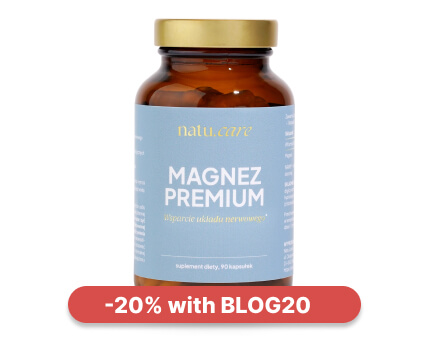
- Magnesium content per day: 305 mg
- Additional active ingredients: Vitamin B6 (2.1 mg)
- Form: capsules
- Serving size: 3 capsules per day
- Sufficient for: 30 days
Product description
The Premium Magnesium + Vitamin B6 dietary supplement is a comprehensive product that combines three organic forms of magnesium (citrate, malate, and diglycinate) and vitamin B6 in highly absorbable forms.
Magnesium is an essential mineral without which our bodies cannot function properly. It supports the immune, nervous, and muscular systems, maintains electrolyte balance, and is involved in cell division and the regulation of mental functions.
Research shows that magnesium supplementation is even more effective when accompanied by vitamin B6, which is included in our product. Vitamin B6 is responsible for the proper functioning of the nervous and immune systems, as well as the proper functioning of the heart.
If you want to safely get rid of feelings of fatigue, concentration problems, hair loss, muscle cramps, trembling, or irritability, reach for Premium Magnesium from Natu.Care, tested by the independent, certified laboratory J.S. Hamilton Poland.
Pros and cons
Pros
- Supports the proper functioning of the nervous and immune systems.
- Reduces feelings of fatigue and tiredness.
- Maintains proper psychological functions.
- The purity of the ingredients (free from anti-caking agents, artificial fillers, and additives such as titanium dioxide, microcrystalline cellulose, talc, magnesium stearate, and silicon dioxide) has been confirmed by laboratory tests.
- High absorption of ingredients.
- Soft capsules that are easy to swallow.
- Suitable for vegetarians and vegans.
Cons
- None.
Additional information
Take with a meal, 3 capsules per day.
The capsules should be taken with at least 250 ml of water.
If you have trouble sleeping, it is advisable to take 1 capsule in the morning and 2 capsules in the evening, no later than 4 hours before bedtime.
Avoid combining with products high in calcium (milk, yogurt, cheese), as this may negatively affect magnesium absorption.
Pregnant and breastfeeding women should consult a doctor before starting supplementation.
User review
I’m very impressed with the speed of delivery. The product itself is of high quality and absorbs well. After two weeks of supplementation, I’ve noticed a significant improvement in muscle recovery, especially during periods of intense training. I highly recommend it!
Natu.Care Vitamin D 2000 UI
Product description
Vitamin D plays a crucial role in our health and well-being. It affects calcium and phosphate metabolism, which translates to healthy bones and teeth. It also helps regulate the immune system, and studies indicate its influence on the functioning of the nervous system.
Vitamin D, although called a “vitamin,” is actually a prohormone that our body produces on its own, primarily under the influence of sunlight. Unfortunately, our modern lifestyle contributes to deficiencies of this essential vitamin. Working in enclosed office buildings, using (necessary!) SPF creams, and covering the body with clothing all make it very difficult, if not impossible, to obtain adequate levels of vitamin D from sunlight. This is why appropriate, year-round supplementation is so crucial.
Vitamin D from Natu.Care is a well-tested vitamin D3 suspended in safflower oil, a plant known for its numerous health benefits. The convenient, easy-to-swallow capsule will make supplementation a part of your daily, healthy routine, improving your overall well-being.
Pros and cons
Pros:
- Ensures proper functioning of the immune system
- Supports the maintenance of healthy bones and teeth
- Maintains proper heart, kidney, and muscle function
- Tested by an independent, certified laboratory
- Convenient and easy-to-swallow capsule
- Clean composition - free from added sugar, gluten, GMOs, lactose, and without preservatives or colorants
Cons:
- None.
Additional Information
Pregnant women and breastfeeding mothers should consult a doctor before using the product. This dietary supplement is intended for a healthy adult population up to the age of 75.
Collagen Booster - Glow Stories
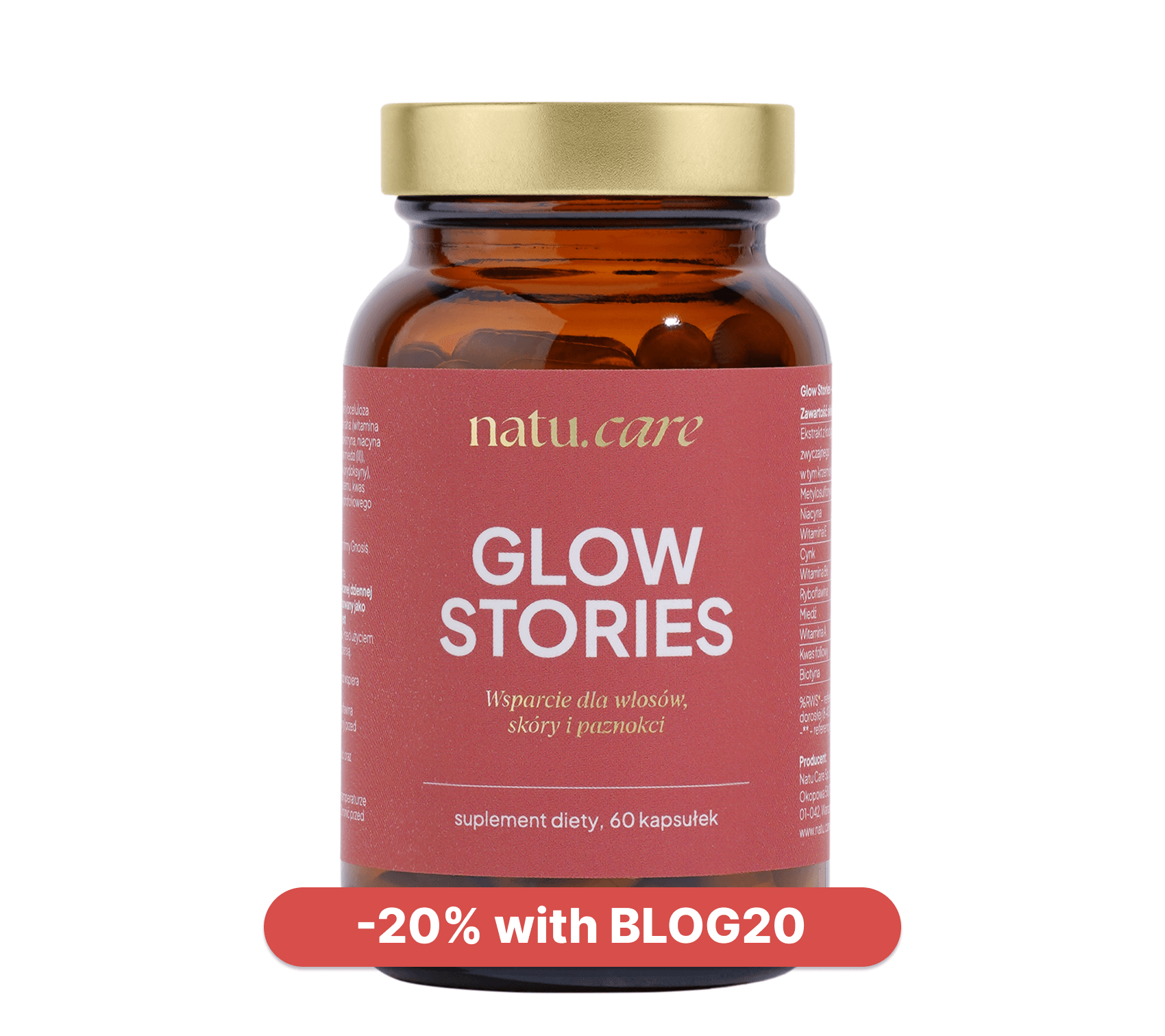
- Active ingredients: bamboo shoot extract, Quatrefolic®, L-Methionine, L-cysteine, vitamin E, vitamin A, niacin (vitamin B3), vitamin B6, vitamin B2 (riboflavin), biotin, zinc, copper
- .
- Form: capsules
- .
- Dose: 1 capsule per day
- .
- Sufficient for: 60 days
- .
Product description
A dietary supplement containing vitamins, minerals and plant extracts thatósupport the skinóhand, hair and nails. The product is especially distinguished by the form of folate – it is Quatrefolic, whichós absorbed very well and is natural.
In addition to valuable vitamins and minerals, such as vitamin A, E, B3, B2 and biotin, the formula contains bamboo shoot extract, whichóry further enhances your beauty.
Pros and cons
A dietary supplement containing vitamins, minerals and plant extracts thatósupport the skinóhand, hair and nails. The product is especially distinguished by the form of folate – it is Quatrefolic, whichós absorbed very well and is natural.
In addition to valuable vitamins and minerals, such as vitamin A, E, B3, B2 and biotin, the formula contains bamboo shoot extract, whichóry further enhances your beauty.
Additional information
A dietary supplement containing vitamins, minerals and plant extracts thatósupport the skinóhand, hair and nails. The product is especially distinguished by the form of folate – it is Quatrefolic, whichós absorbed very well and is natural.
In addition to valuable vitamins and minerals, such as vitamin A, E, B3, B2 and biotin, the formula contains bamboo shoot extract, whichóry further enhances your beauty.
Yango Multivitamin for Women
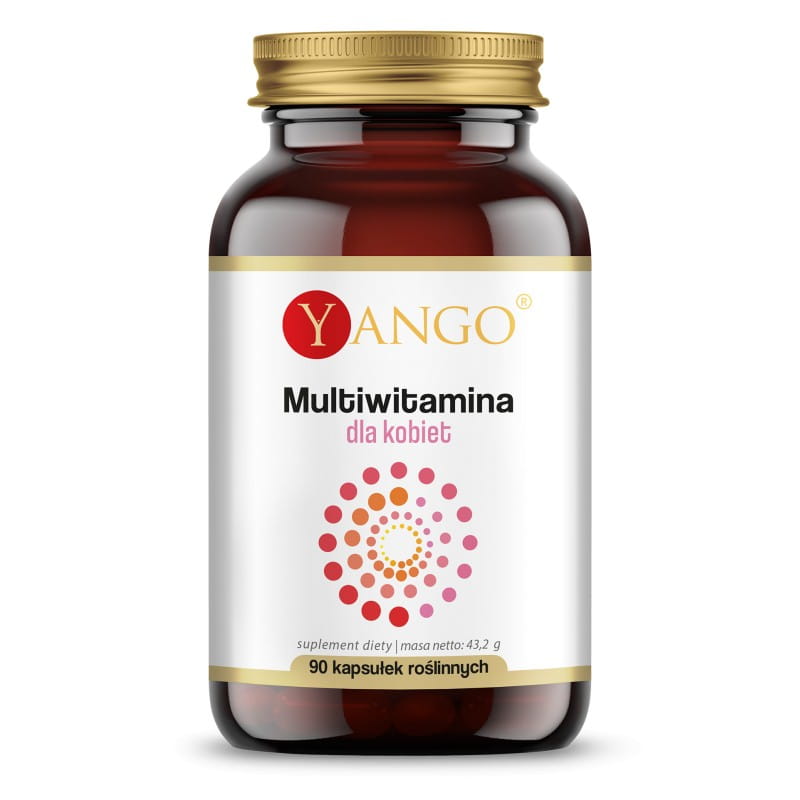
- Most important active ingredients: vitamin A, vitamin C, vitamin D3, vitamin E, vitamin B1, vitamin B2, vitamin B3, vitamin B6, vitamin B9 (folic acid), vitamin B12, vitamin B7 (biotin), vitamin B5 (pantothenic acid), vitamin K2, zinc, selenium.
- Form: liquid .
- Dose: 15 ml per day .
- Packaging: 500 ml .
Product description
Multivitamin for women with up to 26 active ingredients thatósupport the body from within. The product also contains minerals and even collagen, which supports the hair, skin and nails. The liquid form makes it easy to supplement – the product has a fruity taste.
Pros and cons
Multivitamin for women with up to 26 active ingredients thatósupport the body from within. The product also contains minerals and even collagen, which supports the hair, skin and nails. The liquid form makes it easy to supplement – the product has a fruity taste.
Additional information
Multivitamin for women with up to 26 active ingredients thatósupport the body from within. The product also contains minerals and even collagen, which supports the hair, skin and nails. The liquid form makes it easy to supplement – the product has a fruity taste.
Yango multivitamin for men
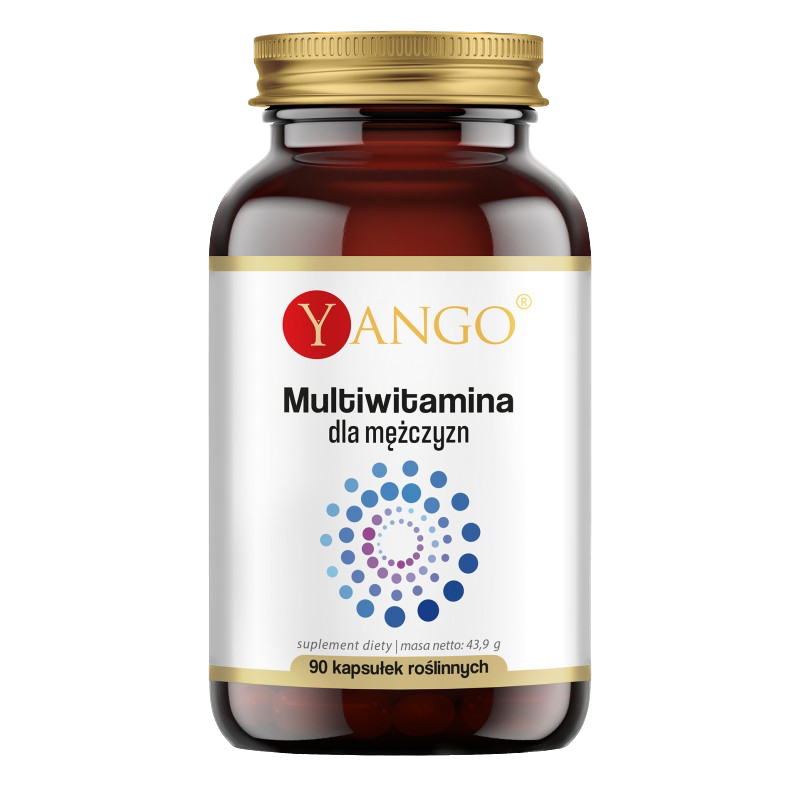
- Most important active ingredients: vitamin A, vitamin C, vitamin D3, vitamin E, vitamin B1, vitamin B2, vitamin B3, vitamin B6, vitamin B9 (folic acid), vitamin B12, vitamin B7 (biotin), vitamin B5 (pantothenic acid), vitamin K2, zinc, selenium.
- Form: liquid .
- Dose: 15 ml per day .
- Packaging: 500 ml .
Product description
Multivitamin for men with up to 26 active ingredients thatóre support the body from the inside. The product also contains minerals and even collagen, whichóry supports the hair skinóhand and nails. The liquid form makes it easy to supplement – the product has a fruity taste.
Pros and cons
Multivitamin for men with up to 26 active ingredients thatóre support the body from the inside. The product also contains minerals and even collagen, whichóry supports the hair skinóhand and nails. The liquid form makes it easy to supplement – the product has a fruity taste.
Additional information
Multivitamin for men with up to 26 active ingredients thatóre support the body from the inside. The product also contains minerals and even collagen, whichóry supports the hair skinóhand and nails. The liquid form makes it easy to supplement – the product has a fruity taste.
OLIMP Gold-Vit A+E z wiesiołkiem i biotyną
Product description
Vitamin A plus E with added evening primrose oil and biotin. Supports hair, skin and nail health, as well as the cardiovascular system.
Why it's worth it:
This is an interesting form of vitamin A plus E - the manufacturer has placed the active substances in pellet form. As the pharmacist explains, this form allows the supplement to be prolonged. On the big plus side, the content of biotin and evening primrose oil in the composition.
The former prevents split ends in the hair and also supports nail health. Evening primrose oil, on the other hand, has a positive effect on the cardiovascular system.
Important
Multivitamin must under no circumstances replace a healthy and well-balanced diet.
See also:
.
- How to look after your health - 13+ tips from a doctor, nutritionist and psychologist
- 8 proven ways to get a healthy and good night's sleep
- Prescription-free tranquillity pills
- Sedation tablets
- Gastrosis tablets
- Best zinc in tablets
- Best magnesium
What is a multivitamin?
.
Popular multivitamins are a combination ofand vitamins and minerals. Such a combination is primarily intended to replenish deficiencies, with each ingredient having a beneficial effect on the body.
When it comes to the form of taking a multivitamin, manufacturers spoil us. At your disposal are:
- .
- tablets, .
- capsules, .
- doses, .
- fizzy tablets, .
- drops, .
- syrups, .
- sachets of powder to dissolve, .
You are sure to find the one that suits you best among them.
Is it worth taking a vitamin complex? Opinions of a nutritionist and pharmacist
.
Vitamins are all about health. And since more vitamins mean more health. You think to yourself, "I'm going to start taking multivitamins, just in case". Before you do, think it over carefully and check out what clinical dietitian Julia Skrajda has to say in this connection.
In standard cases, multivitamins in supplement form are not recommended.
Yes, you read that correctly - you probably don't even need to think about multivitamin supplementation.
People tend to buy the first product off the shelf, which will not be tailored to their actual needs. Many products also contain ingredients that are mutually exclusive. The combination of omega-3 and omega-6 is unhelpful, as is the combination of zinc with selenium. We do not realise this by using 'mixes'..
 .
.
Julia SkrajdaDietitian
..
In turn, Ilona Krzak, MSc in pharmacy, also points out that "combining magnesium with calcium in the wrong ratio is also inappropriate, as these elements compete with each other for absorption. Furthermore, magnesium and calcium should not be taken together with iron, which limits their bioavailability."
Healthy people should make it a priority to eat a healthy, balanced diet - this is to provide the vitamins and micronutrients needed.
Considering supplementation? Do the necessary tests first. Discuss them with a specialist. If he or she recommends supplementation, determine exactly what and to what extent.
Does more mean better?
.
Although it seems impossible, vitamins can also be overdosed. Both vitamin deficiency and excess (i.e. hypervitaminosis) can be a threat to your health. Contrary to appearances, an excess of vitamins and minerals is more dangerous than a deficiency.
Hypervitaminosis can produce a variety of symptoms - depending on which vitamins have been taken excessively. Fat-soluble vitamins, namely A, D, E and K, are most commonly affected. Excess water-soluble vitamins are regularly eliminated with urine.
Incompetent use of supplements can lead to:
- renal failure (too much vitamin D3), .
- liver dysfunction (too much vitamin Aand), .
- gut inflammation and even diabetes (too much iron), .
- stomach disorders, including heartburn and diarrhoea (too much vitamin C), .
- weight loss, nausea and taste disturbances (too little vitamin B12and), .
- fatigue, intestinal disorders, impaired vision or muscle weakness (too much vitamin E).
The general symptoms of faulty supplementation will manifest themselves in the organs where the vitamin or mineral is absorbed and metabolised. The whole body will be affected by the excess, and your mood will be different to the one you wanted to achieve..
 .
.
Julia SkrajdaDietitian
.More than 60,000 cases of vitamin poisoning are reported annually in the US alone - including those involving children under 6and.
Who should take multivitamins and who should not?
.
Multivitamins are usually prescribed for specific conditions of deficiency or increased need.
Additional supplements should not be used by people who do not have a test-confirmed deficiency. A properly balanced diet for a healthy person will provide everything the body needs. Of course, an exception is made for abnormalities or disease states..
 .
.
Julia SkrajdaDietitian
..
Which groups may require additional supplementation in their diet?
.
Although there are a few groups for whom additional supplementation is recommended. This will usually only include a few vitamins or minerals.
The following are the most important ones:
- pregnant and breastfeeding women (remember to test and consult your doctor before starting), .
- people on elimination diets (vegetarians and vegans tend to be vitamin B12 deficient and have poorer iron absorption), .
- persons on long-term ketogenic diets (may require supplementation of B vitamins, as their greatest sources are carbohydrate products), .
- athletes and physically active people (may need supplementation of any water-soluble ingredients), .
- women using contraception (should supplement with B vitamins as they are washed out by the contraceptive pill), .
- people taking metformin-based medicines (they should supplement with vitamin B12 as it increases its excretion from the body), .
- children fed solid foods, i.e. from about 1 year of age (it is advisable to give them vitamin D3 and omega-3 acids - our body does not synthesise them on its own and they should be taken with food, and besides, they are very important for their development).
- Seniors and the elderly (should supplement vitamins and minerals due to their frequent lack of appetite and the number of medications they take. Unfortunately, it is often a challenge for them to take regularly).
Multivitamin preparations are also worth taking during intensive mental work and when recovering from illness.
What vitamins should you take?
What vitamins should seniors, women men look for?
.
There is no general rule for all women, men, older, younger.
Supplementation should always be selected for identified deficiencies or specific symptoms, and should take into account the condition and state of health.
Most often, recommendations involve individually tailored doses of vitamin D3 and omega-3 acids - substances invaluable to our bodies, to which we have limited access: in Poland, we have few sunny days and we rarely eat fish.
There are, however, several cases in which the intake of specific ingredients is recommended.
Pregnant women should take magnesium and vitamin B6 regularly - these reduce discomfort associated with PMS, among other things..
 .
.
Julia SkrajdaDietitian
..
In seniors, vitamin C supplementation will be extremely important. "Although large amounts are taken in food, deficiencies are often observed. And it is an important vitamin: it improves blood clotting, accelerates wound healing and supports immunity. To strengthen immunity, we can also offer zinc supplementation to seniors - under the guidance of a nutritionist or doctor, of course," Julia Skrajda points out.
.
Seniors should also take care of calcium and potassium. "These can be provided through highly mineralised water, but I still observe that seniors are drinking too little of it," - recalls Julia Skrajda.
.
Potassium should be supplemented under the full supervision of a specialist for the fact that older people very often take medication for hypertension. "When taking so-called potassium-sparing hypertension medications and taking additional supplementation of this element, it is very easy to overdose on potassium, which can lead to dangerous side effects," warns Ilona Krzak, MSc, pharmacist.
Potassium should be monitored by a specialist.
Is multivitamins worth giving to children?
.
Before you start giving multivitamins to your children because, for example, he or she is an eater, it is essential to consult your paediatrician or a nutritionist.
Before you start giving multivitamins to your children because, for example, he or she is an eater.
Definitely do not give children vitamins in the form of supplements as their synthetic form has poorer absorption and they may not be suitable for the digestive system.
.
 .
.
Julia SkrajdaDietitian
..
.
For children, multivitamins in the form of OTC medicines will definitely be safer. Currently, the multivitamin preparation registered as a medicine is Multisanostol in syrup.
The best thing for toddlers will be natural products such as fruit, vegetables or natural syrups or nigella oil when they need more immune support substances during illness..
 .
.
Julia SkrajdaDietitian
.A child's daily diet should be supplemented with vitamin D3, such as in drops, as well as omega-3 fatty acids and tran.
How to choose the best set of vitamins.
Finally, I have 4 tips for you so that you always make the best decision when it comes to buying a multivitamin.
- Before you decide on supplementation, do the appropriate research and consult with your doctor or nutritionist to determine together exactly what you need.
- The most important criterion is your needs and the deficiencies you want to supplement. .
- The multivitamin should be tailored to your gender, age, your diet or physical activity. There is also a good chance that you will benefit more from a good selection of individual ingredients.
- Before you buy, check the declared dosage of the individual ingredients on the packaging and what their percentage of the daily requirement is per tablet, which is determined by the RWS index).
Want to learn more about the world of vitamins and minerals and how each one affects our bodies? Be sure to read one of our articles (or preferably all of them):
- Vitamin B12 - properties, deficiency, supplementation .
- Vitamin D3 - action, dosage, supplementation .
- Vitamin A - properties, action, occurrence, deficiency symptoms
- Vitamin B1 - properties, sources, deficiency, excess .
- Vitamin E - properties, action, occurrence, dosage .
- Pantothenic acid - what it is, action, sources, excess .
- Folic acid (vitamin B9) - what it is, properties, requirement, deficiency
- Vitamin B3 - what it is, effects, occurrence, deficiency, excess
- Vitamin K - where it occurs, what it helps with, deficiency symptoms .
- Vitamin B6 - what it is, properties, dosage, supplementation
- Vitamin C - what it is, properties, effects, deficiency
- Niacin - what it is, effects, dosage, deficiency, excess
- Magnesium - properties, deficiency symptoms, best sources .
- Zinc - properties, occurrence, deficiency, excess .
- Chromium - properties, use, supplementation, sources .
- Iron - what it is, properties, requirement, sources, deficiency
Summary
.
Everyone wants to take the best possible care of their health and well-being. Despite our good intentions, we unknowingly reach for multivitamin preparations that may not be tailored to our actual needs:
- The primary source of vitamins for human beings is food.
- The primary source of vitamins for humans is food.
- Before thinking about a multivitamin, ensure a good diet.
- Before taking a multivitamin, ensure a good diet.
- Before starting supplementation, do blood tests and consult your doctor or nutritionist.
- Supplementation overzealousness can lead to hypervitaminosis, which is dangerous. .
- Supplementation with vitamins - not necessarily multivitamins - is advisable for pregnant women, people on restricted diets, athletes and the elderly.
- Children should not take multivitamins in supplement form. Those with OTC (over-the-counter) drug status are safer.
FAQ
.What are the best vitamins for fatigue?
.Research clearly shows that there are several vitamins that particularly help with fatigue. The most important of these are:
- vitamin D: its deficiency is closely linked to increased fatigue , and normalising its concentration in the body will make you more energetic.
- vitamin B12: improves cognitive function , reduces symptoms of fatigue and helps with depressive episodes;
- vitamin C: intravenous application will have the best effect; .
See also what is the best vitamin D.
.Is it worth taking multivitamins in the form of effervescent tablets?
.Effervescent tablets can be a convenient way of supplementation - especially if you have problems swallowing tablets or capsules. They may also be better absorbed. However, they often contain sugar, sweeteners and caking agents, or artificial colours and flavours, which can do more harm than good. Therefore, read labels carefully and remember that the effectiveness and safety of multivitamins, including effervescent tablets, depends on the specific composition and dosage.
What should a multivitamin for seniors contain?
.It all depends on what deficiencies a particular person is facing. Seniors are most often deficient in B vitamins, vitamin C and D, as well as calcium, zinc, magnesium and folic acid. It is also important to ensure that supplements do not interact with any medication you are taking.
What is the best time to take multivitamins?
.There are no specific studies that clearly state when it is best to take multivitamins. It is suggested that it should be taken during or after a meal - this will improve the absorption of the formula, especially those with fat-soluble vitamins (A, D, E and K), calcium, iron and zinc cit@ation.
See also: Best zinc in tablets.
.What vitamins to buy at the pharmacy.
Reach for preparations from proven manufacturers, preferably with standardised ingredients. Before buying, check the leaflet and composition - avoid unnecessary fillers and remember that the dose should cover the daily requirement for vitamins and minerals.
Is there a set of vitamins registered as a medicine?
.Most multivitamins are dietary supplements. Currently, two products for children are registered as OTC (over-the-counter) medicine: Juvit Multi drops and Multi-Sanostol syrup.
What are the most powerful multivitamins on the market?
.The "potency" of vitamins is expressed in their dose and concentration. If you are severely deficient, look for vitamin preparations with high concentrations of the individual components you need.
.
Sources
.See all
.Anemia-Vitamin B12-Deficiency Anemia | NHLBI, NIH. (2022, March 24). https://www.nhlbi.nih.gov/health/anemia/vitamin-b12-deficiency-anemia
Björn-Rasmussen, E., & Hallberg, L. (1974). Iron Absorption from Maize. Annals of Nutrition and Metabolism, 16(2), 94-100. https://doi.org/10.1159/000175477
California, M. S., PharmD, PhD Department of Pharmacy Alta Bates Summit Medical Center Berkeley. (n.d.). Hypervitaminosis: A Global Concern. Retrieved March 31, 2023, from https://www.uspharmacist.com/article/hypervitaminosis-a-global-concern
Cook, J., Dassenko, S., & Whittaker, P. (1991). Calcium supplementation: Effect on iron absorption. The American Journal of Clinical Nutrition, 53(1), 106-111. https://doi.org/10.1093/ajcn/53.1.106
Dev, R., Del Fabbro, E., Schwartz, G. G., Hui, D., Palla, S. L., Gutierrez, N., & Bruera, E. (2011). Preliminary Report: Vitamin D Deficiency in Advanced Cancer Patients with Symptoms of Fatigue or Anorexia. The Oncologist, 16(11), 1637-1641. https://doi.org/10.1634/theoncologist.2011-0151
Frigstad, S. O., Høivik, M. L., Jahnsen, J., Cvancarova, M., Grimstad, T., Berset, I. P., Huppertz-Hauss, G., Hovde, Ø., Bernklev, T., Moum, B., & Jelsness-Jørgensen, L.-P. (2018). Fatigue is not associated with vitamin D deficiency in inflammatory bowel disease patients. World Journal of Gastroenterology, 24(29), 3293-3301. https://doi.org/10.3748/wjg.v24.i29.3293
Khatun, A., Chowdhury, S. D., Roy, B. C., Dey, B., Haque, A., & Chandran, B. (2019). Comparative effects of inorganic and three forms of organic trace minerals on growth performance, carcass traits, immunity, and profitability of broilers. Journal of Advanced Veterinary and Animal Research, 6(1), 66-73. https://doi.org/10.5455/javar.2019.f313
Markun, S., Gravestock, I., Jäger, L., Rosemann, T., Pichierri, G., & Burgstaller, J. M. (2021). Effects of Vitamin B12 Supplementation on Cognitive Function, Depressive Symptoms, and Fatigue: A Systematic Review, Meta-Analysis, and Meta-Regression. Nutrients, 13(3), Article 3. https://doi.org/10.3390/nu13030923
Office of Dietary Supplements-Multivitamin/mineral Supplements. (n.d.). Retrieved 17 April 2023, from https://ods.od.nih.gov/factsheets/MVMS-Consumer/
Roughead, Z. K. (Fariba), Zito, C. A., & Hunt, J. R. (2005). Inhibitory effects of dietary calcium on the initial uptake and subsequent retention of heme and nonheme iron in humans: Comparisons using an intestinal lavage method. The American Journal of Clinical Nutrition, 82(3), 589-597. https://doi.org/10.1093/ajcn/82.3.589
Roy, S., Sherman, A., Monari-Sparks, M. J., Schweiker, O., & Hunter, K. (2014). Correction of low vitamin D improves fatigue: Effect of correction of low vitamin D in fatigue study (EViDiF study). North American Journal of Medical Sciences, 6(8), 396. https://doi.org/10.4103/1947-2714.139291
Ruiz-Irastorza, G., Egurbide, M. V., Olivares, N., Martinez-Berriotxoa, A., & Aguirre, C. (2008). Vitamin D deficiency in systemic lupus erythematosus: Prevalence, predictors and clinical consequences. Rheumatology, 47(6), 920-923. https://doi.org/10.1093/rheumatology/ken121
Suh, S.-Y., Bae, W. K., Ahn, H.-Y., Choi, S.-E., Jung, G.-C., & Yeom, C. H. (2012). Intravenous Vitamin C administration reduces fatigue in office workers: A double-blind randomised controlled trial. Nutrition Journal, 11(1), 7. https://doi.org/10.1186/1475-2891-11-7
Vitamin A. (2012). In LiverTox: Clinical and Research Information on Drug-Induced Liver Injury. National Institute of Diabetes and Digestive and Kidney Diseases. http://www.ncbi.nlm.nih.gov/books/NBK548165/
Vitamin D deficiency and its association with fatigue and quality of life in advanced cancer patients under palliative care: A cross-sectional study-Montserrat Martínez-Alonso, Adriana Dusso, Gemma Ariza, Maria Nabal, 2016. (n.d.). Retrieved 17 April 2023, from https://journals.sagepub.com/doi/10.1177/0269216315601954
Whittaker, P. (1998). Iron and zinc interactions in humans12. The American Journal of Clinical Nutrition, 68(2), 442S-446S. https://doi.org/10.1093/ajcn/68.2.442S
.
Editorials
Meet the team

Ilona Krzak obtained her Master of Pharmacy degree from the Medical University of Wrocław. She did her internship in a hospital pharmacy and in the pharmaceutical industry. She is currently working in the profession and also runs an educational profile on Instagram: @pani_z_apteki

Editor
Graduate of Journalism and Artes Liberales at the University of Warsaw. Since 2017, he has been working with the biggest portals in Poland and abroad as an editor. Previously worked for 3 years in one of the leading pharmaceutical companies - he knows the health and beauty industry inside out. In his free time, he most enjoys playing tennis or skiing.
![Vitamin B12 - where it occurs in the diet and in products [table].](https://cdn-resources.natu.care/uploads/1/balanced_diet_nutrition_healthy_eating_concept_food_sources_rich_vitamin_b12_cobalamin_kitchen_table_1_b84f75bda2.jpg)
Find out where vitamin B12 is found and which products will provide you with it.

Vitamin PP also known as niacin or vitamin B3 supports the proper functioning of the body.
![What is NMN? Effects, effects, side effects [supplements].](https://cdn-resources.natu.care/uploads/1/science_background_with_molecule_atom_abstract_structure_science_medical_background_3d_illustration_1_a5ec4d9cec.jpg)
Everything you want to know about NMN: properties, effects, safety and expert opinions.
